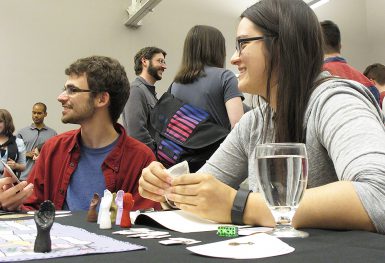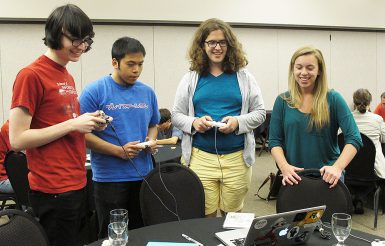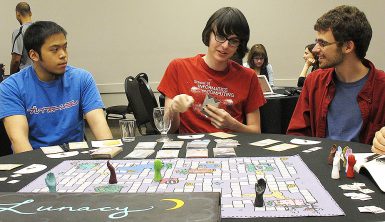Gamers gather for second annual Sigma Play

Friday night, gamers gathered around computer monitors, controllers in hand, trying to beat one another’s highest scores on the latest video games. Others spent hours playing an intricate board game that transports them to a fantasy world.
These gamers were not socializing on a weekend evening in a friend’s basement but rather attending Sigma Play, a two-day gaming conference at the Bloomington Monroe County Convention Center that brings together professional game developers and students interested in game design to network and demo their latest work. (sigmaplay.org)
Sigma Play is the brainchild of Media School lecturer Will Emigh. Since he arrived at IU in 2013, Emigh has been involved in growing the gaming community in Bloomington. He is the advisor for the game design student group, Hoosier Games, and organizes Bloomington Independent Game night, a monthly meeting of game designers and players from central Indiana.
Sigma Play Conference May 22-23, 2015
Will Emigh, Sigma Play organizer and Media School lecturer Sigma Play is my baby, basically. I came up with the idea a couple years ago after going to some fun game design events and deciding we needed something similar in Bloomington. Game designers tend to be relatively solitary.
Lauren Morton, BA’14, game developer, Root 76 I don’t want to say it’s more valuable than the technical knowledge but it’s equally and in a very different way valuable to have to work in a group and understand your role, other people’s roles. We’re in an industry of nerds, and not all of us are always good at group work coming straight out of school. It’s something we have to learn.
There are actually a lot of game designers in town — hobbyists and students and people who are really interested in maybe breaking into the industry. Go out there and meet people, go to conferences, talk to them. You’ve got the normal networking kinds of opportunities then, you can find out about things, but also just learning new perspectives, you know, what if I took what they were doing and put it in a different context, like would that be interesting? You don’t get that if you’re not out there talking to people. You know people from board games don’t talk to people who do role-playing games, don’t talk to LARPers, don’t talk to digital designers, so we wanted to create a space where everyone was getting together and just tossing ideas out there. It’ll be really valuable to bring those ideas across. It’s become so much easier, there’s so many tools and support out there that really you can come in with no background and really create something great. I mean, I hope we continue Sigma Play in the future and we start getting more and more students and students who are able to bring projects that they’ve worked on, and they can show off and they can get feedback and start taking that next step into the professional world.
Produced by Xander Harty
Emigh said he created the conference to further advance the visibility and credibility of the growing gaming community at IU and in Bloomington. In addition to open play Friday evening, attendees heard a keynote address by game developer Bernie De Koven and, Saturday, attended topical workshops.
“My goal has always been to make Bloomington a sort of practicum for students interested in game design,” said Emigh. “Sigma Play lets other people know that this practicum exists and that game design is happening in Bloomington.”
That reputation will grow with the introduction of a bachelor of science in game design, a new degree at The Media School that already has been developed and approved by IU Board of Trustees. The Indiana Commission for Higher Education will consider approval at its next meeting in June, the final step in offering the degree to students.
Lauren Morton, BA’14, a presenter at the conference, agreed that Sigma Play raises awareness about the gaming community and has potential to help grow IU’s new degree.
“It is like a billboard saying ‘we’re here and we’re doing this,’” Morton said of the conference. “Hopefully, more people with the credentials to teach game design will take notice and want to come to IU.”
Alex Bezuska, an independent game developer from Louisville, Kentucky, is one attendee who saw this “billboard” and traveled to Bloomington for Sigma Play.
“I came to the convention last year and really liked it,” said Bezuska. “I knew the gaming community here was kind of new, and I was excited to help get it started.”
Last year’s Sigma Play created a buzz that brought alumna Jen Helms back to Bloomington as a presenter for this year’s conference. Helms, who graduated from IU with a degree in biology, is a co-founder of the educational game development company Playmation Studios.

After Helms graduated from IU, she spent time as an environmental educator at Yosemite National Park, teaching children about nature and science as they were surrounded by it. Helms said this immersive teaching method is what led her to educational game development.
When Helms learned of last year’s Sigma Play, she was excited to return to Bloomington and share her journey with current students.
“My advice to students is to examine your experiences closely,” Helms said. “Some things that seem kind of disparate have a connection. Examining your experiences closely and exposing yourself to new things will ultimately make you a better game designer.”
Allowing gamers to gain knowledge and network with successful professionals like Helms is another reason Emigh created the conference.
“It’s important to show aspiring developers that it’s possible to get from student or hobbyist to professional,” said Emigh. “The conference is designed to encourage networking. Even the presentations are hands on and require interaction to form connections.”
Nick Laplante, a junior studying game design in The Media School, chose to attend the conference because of the opportunity it provided for networking and creative brainstorming.
“Playing games with someone is always an interesting way to network,” he said. “I’m always excited to try out a few new games and maybe get some ideas for my own work.”
With The Media School’s new curriculum in game design expected to go into effect this fall, members of the Bloomington gaming community foresee networking events like Sigma Play to continue to grow.
“I think it will raise the profile of the game development program,” said Emigh of the new degree. “It will give students an opportunity to interact with a larger game community and come to Sigma Play looking to improve games they’ve already developed in classes.”
Morton agreed that the formality of the new degree will help provide recognition for game development at IU and will ultimately lead to more resources for the program. Morton studied telecommunications, business and psychology while at IU, in addition to taking every game design course that was offered. While she said she wishes she could have received the official game design degree, she felt like she played an important role in its creation.
“Part of my trial was to be a data point to prove that this degree needed to be there,” she said. “We didn’t always have the resources or alumni to help guide us. When I show up, it’s my job to be that person for current students.

Other students, like Morton, who missed the opportunity to earn the game design degree said the new plan will provide prestige and visibility for the gaming community. They have no regrets, however, about their experience at IU and believe the mentorship they received from the tightly knit gaming community in Bloomington was enough to help them succeed in the profession.
Second year Media School graduate student Chris Ingerson said his experience as a leader of Hoosier Games and the connections he has made will compensate for the fact that he could not earn an official game design degree.
“I’m lucky I came through when I did,” he said. “I got my current job because one of the guys who leads Hoosier Games when I started asked if I was interested. If I came through any later, yeah I would have gotten the degree, but I would have lost that experience.”
Ian Sundstrom, BFA’12, said that the visibility and formality of a game design degree combined with events like Sigma Play and opportunities like Hoosier Games and BIG night will create the optimal environment for gamers who are aspiring developers.
“I think the degree is another exciting step forward for this growing community,” said Sundstrom. “It will strengthen things from the IU side, and the Bloomington gaming community has been and will be here, regardless.”

